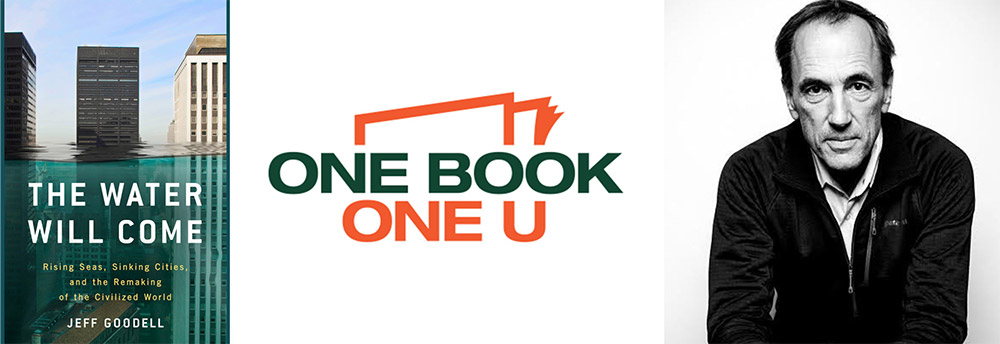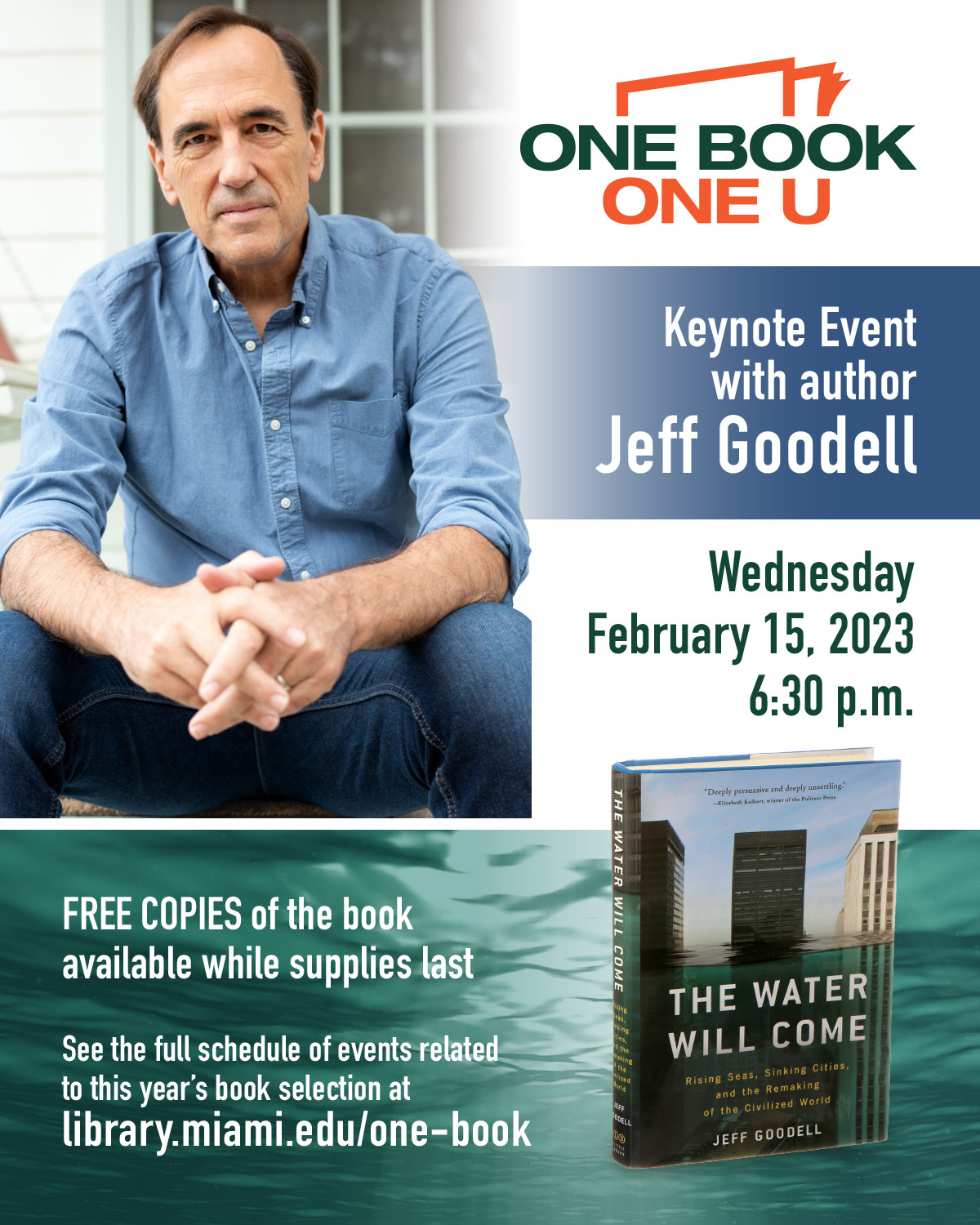Accessibility Options:
subjectId: 690671
visibleTabCount: 4


The Water Will Come, by Jeff Goodell
This year's One Book, One U selection is The Water Will Come: Rising seas, sinking cities, and the remaking of the civilized world by Jeff Goodell
One Book, One U Common Reading Program
The One Book, One U program selects a book for each Spring semester to provide a shared educational experience in our university community. Find information on upcoming events as well as research resources, dicussion guides, and more!
Pick up a copy of the book!
Visit Richter Library's Access Services desk to receive a free print copy of the One Book, One U selection, while supplies last!
Climate Change News
http://feeds.nature.com/nclimate/rss/current
Find a copy of the book in a library!
If you are a member of the UM community, use the links below to get access to the ebook and audio book:
If you are a member of the South Florida community, check your local library to find a copy of the ebook available for check out.
If you are a member of the South Florida community, check your local library to find a copy of the ebook available for check out.
Events
We are still planning events for Spring 2023. Please check back for updates. Find the full list of events on the One Book, One U website. If you are planning an event related to The Water Will Come, please feel free to let us know about here: https://forms.gle/hGvomoe5EknYcezi9
<b>SAVE THE DATE: Spring 2023 Author Event</b>
UM Resources
- Climate Resilience Academy
The Climate Resilience Academy is intended to be a functional unit that supports the UM Schools and Colleges in interdisciplinary, problem-driven research and education to train the next generation and deliver solutions to climate change impacts and other environmental stressors, in partnership with industry, government, universities, and other stakeholders.
Databases
Search for research based on themes in The Water Will Come. Most resources focus on environmental sciences, climate change, and related fields.
- ProQuest Research Library
ProQuest Research Library provides in-depth coverage of the top 150 core academic subject, including 5,060 titles -over 3,600 in full text- from 1971 forward. It features a highly-respected, diversified mix of scholarly journals, trade publications, magazines, and newspapers. - Sociological Abstracts
Sociological Abstracts indexes and abstracts research literature published worldwide in journals and other serial publications.Social Planning/Policy Development (SOPODA) is included as a subfile, providing additional literature on policy issues addressing violence, abuse, housing, the environment and other social issues. - Nexis Uni
Nexis Uni™ features more than 15,000 news, business and legal sources from LexisNexis®—including U.S. Supreme Court decisions dating back to 1790—with an intuitive interface that offers quick discovery across all content types, personalization features such as Alerts and saved searches and a collaborative workspace with shared folders and annotated documents. - Environment Abstracts
Environment Abstracts (formerly Environment Abstracts published by LexisNexis) encompasses all aspects of the impact of people and technology on the environment and the effectiveness of remedial policies and technologies. As of 1994, the database also provides expanded coverage of energy-related issues.Environment Abstracts provides access to more than 950 journals published in the U.S. and abroad. The database also covers conference papers and proceedings, special reports from international agencies, non-governmental organizations, universities, associations and private corporations. Other materials selectively indexed include significant monographs, government studies and newsletters. - Gale OneFile: Environmental Studies
Gale OneFile: Environmental Studies and Policy answers inquiries about environmental concerns with coverage journals and reference content from Delmar and diverse perspectives from the scientific community, governmental policymakers, and corporate interests. - Environmental Engineering Abstracts
Environmental Engineering Abstracts covers the world literature pertaining to technological and engineering aspects of air and water quality, environmental safety, and energy production. - Environmental Protection Agency (EPA)
Content from the EPA. - Environment and Urbanization
This twice-yearly journal focuses on urban and environmental issues and their interconnections, with a particular emphasis on Africa, Asia and Latin America . - Society of Environmental Journalists (SEJ)
The Society of Environmental Journalists is the only North-American membership association of professional journalists dedicated to more and better coverage of environment-related issues. SEJ’s mission is to strengthen the quality, reach and viability of journalism across all media to advance public understanding of environmental issues. - United Nations Resources on the Environment
Dag Hammarskjold Library Research Guides - UN Environment Programme
Includes information by theme. - Florida Department of Environmental Protection
Readings
- Rising seas are turning Miami's high ground into hot property (CNN)
- Gentrification strikes Miami's Little Haiti as beach residents flee rising water (National Catholic Reporter)
- Miami advances plan to move homeless onto island (News Channel 8)
- There is no Planet B:Why climate change is an LGBTQ issue (GLAAD)
- Climate Resilience: A multi-faceted approach (syllabus and modules)
UM Libraries Specialists
- Data & Visualization Services at UML
The Data & Visualization Services department of the University of Miami Libraries promotes data literacy on all campuses through education, consultation, and curation. We provide equitable expert advice on the components of the research process (discover, planning, collection, preparation, analysis, publication, and long-term management). - UM Libraries' GIS Services
- UM Special Collections
- Manuscript & Archival Collections from UM Special Collections
Instructor Reading Groups: Fall 2022
Are you interested in including the 2022-2023 One Book, One U common reading selection, Jeff Goodell's The Water Will Come in your teaching? Join us for a facilitated reading group to discuss how to teach The Water Will Come, for UM faculty, staff, and graduate students. Organized by the Learning Innovation and Faculty Engagement team and UM Libraries, this initiative allows interested instructors to explore how to incorporate the text into their classrooms.
Please join us for one of our Instructor Reading Group sessions:
Sessions will be held over Zoom. Please register for one session only. Each session will cover the same material, and use the same facilitating prompts. Register now using this link: https://umiami.qualtrics.com/jfe/form/SV_0wHFVC54TuKrT9A?jfefe=new
Please join us for one of our Instructor Reading Group sessions:
- Wednesday, November 2nd, 5 pm - 6 pm
- Thursday, November 10th, 12 pm - 1 pm
Sessions will be held over Zoom. Please register for one session only. Each session will cover the same material, and use the same facilitating prompts. Register now using this link: https://umiami.qualtrics.com/jfe/form/SV_0wHFVC54TuKrT9A?jfefe=new
Reading Guides
Curious about The Water Will Come? Check-out the guides below for more information!
Class Discussion Questions
Below are questions developed by Dr. Robin Bachin for use in the classroom. These questions can be used to address a portion of the book in an inviting and engaging way.
Questions to Discuss
1. What is the relationship among the melting of polar ice caps, drought in California, wildfires in Colorado, and sea level rise in Miami?
2. What is the projected sea level rise by 2100? Why does it matter?
3. How do you balance the present-day need for jobs and belief in the need to drill for oil or burn fossil fuels and the longer-term need to reduce CO2 emissions to reduce global warming?
4. What factors set off the real estate boom in Miami in the early part of the 20th century? How has that history impacted environmental and climate conditions today?
5. How are developers today thinking about sea level rise and the future of Miami?
6. Why are real estate agents so reluctant to talk openly about addressing climate change and sea level rise? Are they abdicating their responsibility?
8. How would you compare the situation in Lagos to that in Miami? What are climate refugees? What do you think will happen to the people who live in the Makoko slums?
9. Many climate advocates are pushing for governments in threatened areas to create strategies and mechanisms for planned retreat. What would that look like? What are some obstacles to implementing these plans?
10. Can nature always be tamed? Can we learn to live with water?
Questions to Discuss
1. What is the relationship among the melting of polar ice caps, drought in California, wildfires in Colorado, and sea level rise in Miami?
2. What is the projected sea level rise by 2100? Why does it matter?
3. How do you balance the present-day need for jobs and belief in the need to drill for oil or burn fossil fuels and the longer-term need to reduce CO2 emissions to reduce global warming?
4. What factors set off the real estate boom in Miami in the early part of the 20th century? How has that history impacted environmental and climate conditions today?
5. How are developers today thinking about sea level rise and the future of Miami?
6. Why are real estate agents so reluctant to talk openly about addressing climate change and sea level rise? Are they abdicating their responsibility?
8. How would you compare the situation in Lagos to that in Miami? What are climate refugees? What do you think will happen to the people who live in the Makoko slums?
9. Many climate advocates are pushing for governments in threatened areas to create strategies and mechanisms for planned retreat. What would that look like? What are some obstacles to implementing these plans?
10. Can nature always be tamed? Can we learn to live with water?
UM Instructional Designers
Want more ideas and activities? Reach out to the Learning Innovation & Faculty Engagement team at Academic Technologies! Contact them at life@miami.edu. Find more information on the Academic Technologies website.
Discussion questions
Using the Chapter Summaries document, select a chapter that relates to your class or group and host a discussion session. As a starting point, you can use the questions below, adapted from the American Library Association Book Discussion Group online guide.
Questions to Discuss
Questions to Discuss
- What does Goodell do to criticize responses to sea level change? What does the author wish to reform or change?
- Does the book offer a central idea or premise? What are the issues being raised?
- Do the issues raised by Goodell affect your life? How so? Directly, on a daily basis, or more generally?
- What evidence does Goodell provid to support the central ideas of the book? What sources does he use, and how does he use them?
- Is the evidence Goodell provides convincing? Is it relevant or logical? Does it come from authoritative sources? Is Goodell an authority? If so, how?
- Does Goodell make any unsupported claims? What are they, and what evidence would be needed to support them?
- What kind of language does Goodell use? How does his writing help or undercut his premise?
- What implications does Goodell draw for the future? What are the short-term and long term consequences to the issues being raised in the book?
- What solutions does Goodell offer? Who would implement those soluctuions? How probable is success?
- How does Goodell make a call to action to the readers?
- Are the issues raised by Goodell controversial? If so, how? What are the different sides of the controversy?
- What specific passages of the book or chapter struck you personally- as interesting, profound, incomprehensible, illuminating, etc?
- What did you learn from reading the book? Did it broaden your perspective?
Contact Information
This guide is maintained by the following individual(s):
